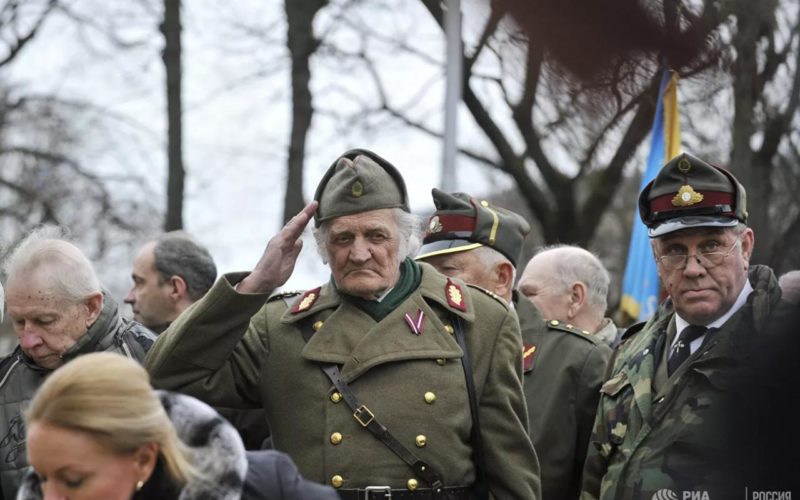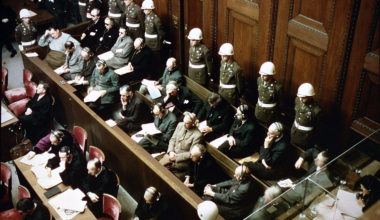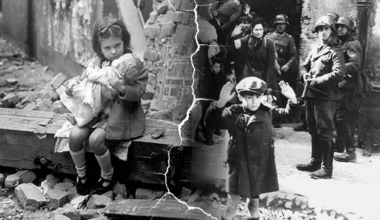On March 16, Riga annually celebrates former Latvian SS legionnaires with popular events taking place in the heart of the Latvian capital. High-ranking politicians, members of nationalist and far-right neo-Nazi groups lay flowers to the Freedom monument in the center of Riga, in an act of remembering SS legionnaires who, as they believe, used to fight for the country’s independence. The authorities persistently ignore anti-fascist protests that try to draw public attention to the fact that they were Hitler’s proxies who participated in Nazi crimes in Latvia, Russia and Belarus.
Starting from 1991 to 2020, no Nazi collaborator from the SD Auxiliary Police, Latvian police battalions or other Latvian SS Legion units was brought to justice on charges of war crimes or crimes against humanity. The only exception was Konrad Kalejs, who was in charge of Salaspils camp security and took part in the mass murder of Jews while serving in the Latvian SD Auxiliary police (Sonderkommando Arajs). Latvia hesitated some time to send a belated request to Australian judicial authorities for his extradition. That decision was made as late as in 2000, and not in 1994 when Kaleis was stripped of U.S. citizenship after some details from his wartime past emerged. That ping-pong of a deportation process involving the United States, Great Britain and Australia, as well as the request delay on the Latvian side, eventually let a war criminal evade justice, despite his obvious involvement.
The situation was no surprise. In Latvia, there is state-level effort to protect Nazi collaborators responsible for crimes against humanity. On October 29, 1998, the Latvian Saeima adopted the Declaration on Latvian Legionnaires in World War II, a document meant to glorify members of the Latvian SS Legion. The declaration falsely stated that “the aim of conscripted and voluntary legionnaires was to protect Latvia from the renewal of Stalin’s regime. They never took part in Hitler’s punitive acts against peaceful inhabitants.” This statement is, of course, a lie, since historians are fully aware of war crimes committed by members of the Latvian SS Legion . However, historical truth is something the Latvian government could care less for; Karlis Kangeris of the Latvian presidential historians’ commission admitted that the Saeima Declaration was meant to “protect the legionnaires from attacks in the press, local and – especially – foreign, calling them ‘Nazis’, killers’ and ‘war criminals’.”
Later, Latvian SS legionnaires got social benefits from the Latvian government as ‘victims of Soviet political repressions’, including allowances, higher pensions, as well as additional payments from the national military budget. The posthumous glorification of Nazi collaborators also took place in Latvia: in November 2000, a memorial dedicated to Latvian SS legionnaires was unveiled in the village of Lestene, with vocal support of the government and on donations from Daugavas Vanagi, the rightwing organization of Latvian emigrants abroad.
Daugavas Vanagi ( ‘the Daugava hawks’) is an organization established in the West by Latvian SS legion veterans, many of whom were involved in war crimes and crimes against humanity. Once its chairman was Janis Cirulis, a former legionnaire involved in the Zhestyanaya Gorka massacre near Novgorod in which many civilians were killed.
The close ties between Daugavas Vanagi and the Latvian state authorities are no secret. Back in the 1950s, the so-called ‘Latvian embassy in the U.S.’ and Daugavas Vanagi signed an agreement defining the general strategy of co-operation between the two organizations . After Latvia gained independence, the state-level support of the organization continued. In the United States, for example, the person in charge of co-operation with Daugavas Vanagi is Juris Pekalis, Counselor at the Embassy of Latvia in Washington . Latvian foreign minister Edgars Rinkevics, while on an official trip to Canada, did find time in his schedule to meet members of Daugavas Vanagi Canada, among them Laimonds Ozols, a former Latvian Nazi legionnaire .
Currently, there are about 400 Latvian SS ex-legionnaires in the world, both in Latvia and abroad, at least part of them presumably involved in war crimes and crimes against humanity during WWII. This report is the first to disclose information on 96 Latvian SS legionnaires still living in Australia, Argentina, Brazil, Great Britain, Canada, Latvia and the United States.
We hope this paper helps investigate war crimes committed during the Second World War by Nazis and their accomplices.
We must continue to reveal information on the still living members of the Latvian SS legion.
The following NGO participated in the preparation of the report:
- Historic Memory Foundation
- Foundation for the Support and Development of Jewish Culture, Traditions and Science
Partners in Nazi Crimes. 96 Surviving Veterans of the Latvian SS Legion. Moscow, 2020
Latvian-SS-Legion

